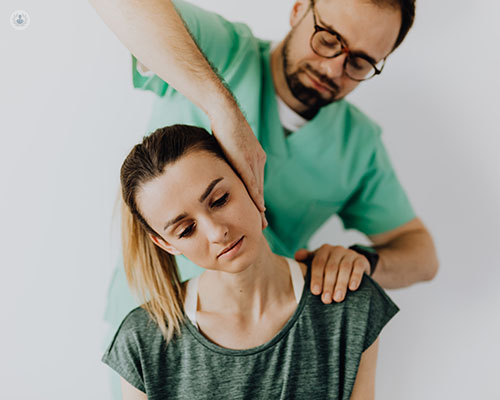Neck pain: eveything you need to know
Escrito por:Neck pain is very common, with about 1 in 3 people experiencing some form of neck pain every year. While this pain usually subsides quickly, it can sometimes be a sign of something much more serious.
Dr Debajit Phukan, a renowned pain management specialist, gives you his expert insight into the different causes and treatments for neck pain in our latest article.

What are the most common causes of neck pain?
Most neck pain comes from different structures in the neck, such as the muscles and ligaments, or the small joints between various vertebrae. Within the neck are discs, nerves, and joint capsules, all of which can cause pain.
The most common cause of neck pain is wear and tear as we age, or sometimes disc herniation. Neck pain can also be caused by injury to the neck. One example of this is whiplash, where the head is jerked backward and forward in a road traffic accident, straining the soft tissues and joints in the neck.
The pain can also arise from other diseases or conditions, like rheumatoid arthritis, cancer, or meningitis. Other unrelated factors, such as stress, anxiety, and fibromyalgia can also contribute to neck pain.
Can neck pain be a sign of something serious?
Neck pain could be a sign of something more serious if there is a sudden onset of severe pain that is not relieved by simple painkillers, and does not go away within a week or so. Another sign that it could be something more serious is if you have suffered any injury, or the neck pain is accompanied by a headache, a sign of infection, a fever, a stiff neck, or pain going down the arm or legs. Although these are not very common, you should always be on the lookout for these symptoms.
What is the best way to relieve neck pain at home?
Luckily, most neck pain goes away after a few days. Common home treatments for neck pain include wrapping hot towels around the neck for about 20 minutes or so, or applying an ice pack for 5 minutes, two or three times a day. Simple medications such as paracetamol and ibuprofen may also be used. Another thing to consider is your posture, especially when you are working at a computer. The computer should be at eye level, and you should sit up straight at your desk. It is also recommended that you take frequent breaks and do stretching exercises.
Some common things I have noticed that could aggravate neck pain are holding your mobile phone in between the neck and the shoulder, smoking, and carrying heavy bags.

When should you see a doctor about chronic neck pain?
Chronic neck pain is usually defined as pain that persists for more than 3 months. The pain can be localised to the neck or radiate down the arm and leg. If simple painkillers and exercises do not improve the pain then you should see a doctor for further discussion and investigation, which could include MRI scans, CT scans or X-rays.
The first thing to do in most cases of acute neck pain is to rest for 2 or 3 days. If the pain does not subside, you should discuss with your doctor what other treatments are available. With any pain, be it neck or back pain, there are usually 4 principles: exercise, painkillers, injection therapy, or surgery.
In most cases surgery is not necessary, as the pain can be controlled by exercise and painkillers. A doctor may order certain investigations including a scan, and if this shows significant disc herniation or nerve compression, the doctor may refer you to a surgeon.
How is the cause of neck pain determined?
The cause of neck pain is usually determined through various investigations, such as:
- X-rays
- MRIs
- CT scans
- Nerve conduction velocity (NCV) tests
- Electromyographic (EMG) nerve testing
- Blood tests
If you suffer from neck pain and would like to seek an expert’s opinion on the best possible treatment, you can book a consultation with Dr Phukan via his Top Doctors profile.


